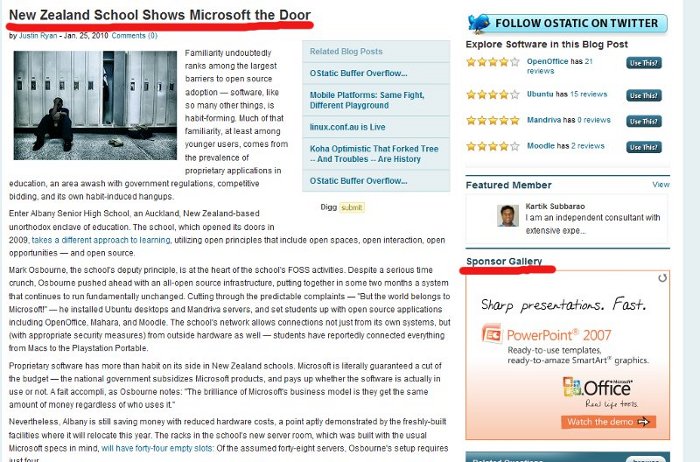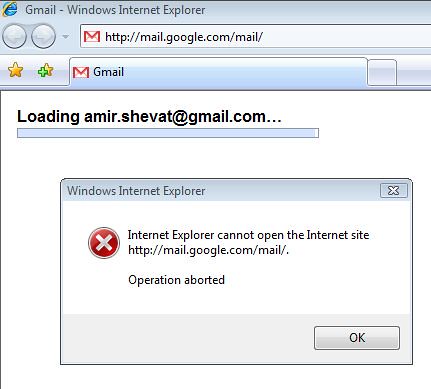 A software architect has an impotent role in software development- he explores the business needs, chooses the right technologies, designs and aids in implementation. Amongst other things an architect serves as a quality gate in the origination, preventing bad technology decisions and migrating technological risks. But what happens when a quality gate is raised to high and risk mitigation is more impotent than the needs for change – then the architect becomes a roadblock to any change and innovation, the architect them becomes a person you need to “pass” rather than “consult with”.
A software architect has an impotent role in software development- he explores the business needs, chooses the right technologies, designs and aids in implementation. Amongst other things an architect serves as a quality gate in the origination, preventing bad technology decisions and migrating technological risks. But what happens when a quality gate is raised to high and risk mitigation is more impotent than the needs for change – then the architect becomes a roadblock to any change and innovation, the architect them becomes a person you need to “pass” rather than “consult with”.
Category Archives: Opinion
6 Useful Things Google Search Provides That Are Not Search / Useful Google Search Tools
Lately it is kind of popular to trash Google. Very much like Microsoft, people love to complain about companies that take an important part of their daily life. Google is now an integral part of our life not only for search but for many other things. A good friend saw me convert foreign exchange on Google search and was very surprised you can do that. So here is a list of things I do in Google search which are not search related.
Looking up What’s the Time in Other Places Around the World
Living in a far away island in the pacific with friends in Europe and America, this tool is a great help.

Continue reading
Forget About Software Configuration, Settings and Options – Choose the Right Defaults

Common pitfall “I am not sure what to do…. let’s make it configurable”
You hear this all the time in software companies – Some business analysts, developer or product manager trying to solve a dilemma in software development by pushing the decision to the end user side. “Let’s make it configurable” seems like a get-out-of-jail free card if you can’t make you mind about colors, screen layout and many other hard choices we have to make many time when designing our software.
People think they want free choice, while in fact they want the right choice.
It is a common mistake to think that making some aspect of your application configurable is necessarily a good thing. Software users rarely go into configuration and edit the software options to fit their needs. Users expect the software to work “by default” / “out of the box” / “no hustle”. Continue reading
Automatic online advertisement finally developed a twisted sense of humor.
In an interesting blog post about New Zealand education system moving from Microsoft to open source. I have noticed that the advertisement picked for the blog post, indicates that automatic-advertisement finally developed a sense of humor:

I hope I get the same kind of advertisement and then we can have a recursive blog post.
Software As A Service Takes The “Free Beer” Out of Open Source

Free software means that computer users have the freedom to cooperate with whom they choose, and to control the software they use. To summarize this into a remark distinguishing libre (freedom) software from gratis (zero price) software, Richard Stallman said: “Free software is a matter of liberty, not price. To understand the concept, you should think of ‘free’ as in ‘free speech’, not as in ‘free beer’.1
The reality is quite different from this philosophy. Up until now open source software was, for most people, free beer rather than free speech. Well, the beer party is over, and cooperate companies have a new business model strategy called SAAS.
Continue reading
Open source community should employ Microsoft’s business strategies
In one of the press conferences I attended 6 months ago, Steve Bulmer was asked “Why can’t Microsoft be cool like Apple?”
His reply was simple and to the point:
“I rather be popular than cool”
He further explained that Microsoft business strategy is to try to reach EVERYONE and not only the cool guys.
I suggest that we, as the open source community, employ the same logic:
“We rather be popular than the good and righteous”
Let me explain why we should be popular rather than right.
The baseline assumptions of this article
- Microsoft is popular – at the time this article is written, Microsoft has a large market share in many IT and retail industries – the company must be doing something right.
- Open source is less popular – at the time this article is written, most open source products do not have the market share their makers have wished for – so there is still something we need to do
- One of our targets as open source community is to become more popular – growing popularity and market share will drive open source prosperity in many aspects
The secrets of Microsoft’s popularity and market share
These are all well known and published secrets:
- Microsoft focuses on creating mass-market products – if it is not a 1 billion dollar in revenue you can forget about it.
- Microsoft excels at creating an echo system of partners and independent software vendors (ISV)- it is estimated that Microsoft eco system earns 9$ for every dollar Microsoft earns. Think about it!
- Microsoft spends millions of dollars on user experience – my Ubuntu might provide a great user experience but to fix things I sometimes need to go to command line, it’s been a very long while since I had to go to the command line to fix something in XP. Anyway, my point is that Microsoft puts great emphasis on how it looks.
Why isn’t open source as popular as it should be?
As always, it is mostly a matter of perception:
End users: ‘It is too hard’ ‘I am not a techi’ ‘There is no proper support’ ‘It does not come out of the box’
From a consumer perspective, most open source products are considered a niche and the realm of the super-technical (AKA geeks). I am not talking about popular products like Firefox, I am talking about the less popular majority of the open source offering. While most consumers find the mistaken notion of open source as free in the “free beer†perspective, they are still hesitant about support, user experience and simplicity. People think that some problems in open source products require command line, and let’s admit, VI is still not the preferred way of the masses to fix problems. Additionally, most consumers do not install anything by themselves, they like their software to come out of the box, preinstalled and ready to go.
Partners and ISVs: ‘Too complex’ ‘High risk’ ‘No commercial support or liability’ ‘Contagious license, I have to be open source as well’
From a partner perspective, open source sometimes seems as a risk to work with. Some commercial independent software vendors are afraid of lack of support and accountability. Simple, UI-driven integration between open source products, is still something rare, and human documentation is sometimes lacking (not talking about geek forums). Additionally, some cooperate lawyers are more afraid of open source licenses than the bubonic plague. One should not under estimate this last point, lawyers stop any development and partnering program in a blink of an eye, no matter how affordable and profitable it might be, it is their job to do so.
The first steps towards growing open source market share.
- Use the 80/20 – Pareto law
- Focus simplicity – KISS lawKeep the project easy to use – aim for the lowest common denominator and work up from there.Always ask yourself – if I wasn’t the subject matter expert, would I find it easy and simple?
Always ask yourself – can I achieve this functionality in a simpler, clearer way?
- Focus on UXUser experience is under estimated by most developers but please believe me – user experience is THE KEY for the success of 90% of any software project
- Don’t use GPLUse a commercial friendly open source license like Apache, MIT or MPL. Read the next section to learn why you should do that.
Create mass market products – 20% of the applications drive 80% of the adoption. Firefox is an example of a great adoption driver.
Why I think GPL is a poison pill for open source market share.
I was working in a big Telco company at the time when I got this kind of email -“All development over open source products or libraries should be stopped. A list of all open source licenses should be sent to the company’s law firm”
GPL is considered a dangerous license. It does not matter at all if that is true or not (I think it is not dangerous)- it is a matter of perception and not truth. Changing perception is extremely hard. Public perception sends people to jail, and makes stock markets fall. Even Microsoft found it hard to change perception regarding Vista.
GPL is considered contagious sticky open source license, it is also considered dangerous because people think it will make their software GPL without their consent, but worst than that, it is considered hard to understand and untested in court. If I was a lawyer, I would consider it a risk and lawyers, even more than most people, try to avoid risks as much as they can.
Some might say that GPL has done the open source community a lot of good, that it is the right way to secure the openness of the code, but look at our basic assumptions – right is OUT, market share is IN.
We as an open source community should drive software released under MPL, Apache, and any license which is considered safe and simple, and hope that the GPL perception slowly fade away.
Will Microsoft be hurt from this new approach?
No, it will thrive. Microsoft, like all super-big companies, is driven by revenues and market growth. If the open source will be successful and drive the market to grow, it will also grow Microsoft’s market. In simple terms if the market grows as a result of these recommendations, and it will, everybody will benefit from this- Google, IBM, Microsoft and all the rest of the big and small software and hardware vendors will cheer the open source community.
There is hope at the end of the tunnel.
We have made great progress; some open source products are now very popular both in the server side and the client side. If we employ a little more business savvy strategies and generate strong partners and echo system we will grow the entire software market. We will not only drive the open source business, but also benefit others and even help fight recession.
One big happy family, Right?
How much should a web site really cost?
Lately I have been asked by many people how much should they pay for a personal or small business website. It seems that these are good times to get some extra cash from a web initiative.
The problem is that, for most people, building and hosting a website is somewhat of a mystery. And when people treat something as a mystery they tend to over complicate it and over pay for it. Some people I talked to spent 20-100$ on simple basic hosting alone! That is, in most cases, more than what they need to pay.
Continue reading
10 ways to spot a good software consultant

How do you spot a good software consultant? A good software consultant could be the key for your business success and bad consultants could be very damaging and counterproductive. Here are 10 cummulative ways to spot a good software consultant (can also be read as – 10 tips for the good software consultant) Continue reading
Does the open source professional services business model suck?
Today I participated and lectured at an open source event. It was great to meet enthusiastic people that believe in something bigger then themselves. These events are always a mixture of young people full of vigor and need for rebellion as well as more balanced older people that have believed in open source for a long time.
I have been intrigued with open source and open source business models for a long time now, so I might belong to the second group.
Anyway, in the keynote, the speaker talked about open source business models, saying that the professional services business model is better then proprietary code business model because it provides real value to the end consumer and because you get a return of your investment in this business model.
1) I have seen companies misuse the professional services business model (open source or not) – selling poor service and wasting the clients time and spending his money with "experts" that know very little.
2) There is no motivation for a company, basing its business on open source development and professional services, to create simple and easy to use application. This is because simple and easy to use applications do not generate the need for professional services. Professional services thrive on complexity and difficulty.
 3) Professional services business model (open source or not) can create a tension between the service provider that wants to prolong the duration and manpower sent on a project and the client how wants exactly the opposite
3) Professional services business model (open source or not) can create a tension between the service provider that wants to prolong the duration and manpower sent on a project and the client how wants exactly the opposite
4) I am not sure the open source professional services business model is a big enough business to drive the entire market to open source products or to sustain open source companies.
I have once personally been told in an open source project – “Do not add this auto-configuration feature, it will kill our professional services” of course after a long “discussion” we added the feature, but the potential to provide a sucky product just to satisfy this open source business models was still there.
I am still thinking about and waiting for the business models that can really sustain and grow a large scale and successful open source company.
You might also what to read how to spot a good software consultant
Switch from Internet Explorer to Firefox?
Lately, I seem to have a problem log-in into Gmail from my Internet Explorer, this happens both at work (IE over Vista) and at home (IE over XP).
I get this wonderfully informative error message:
Doing a couple of “refresh” helps sometimes.
But what really helps is using FireFox instead of Internet Explorer- This problem does not happen in FireFox.
Some of my friend and colleagues have reported the same problem.

